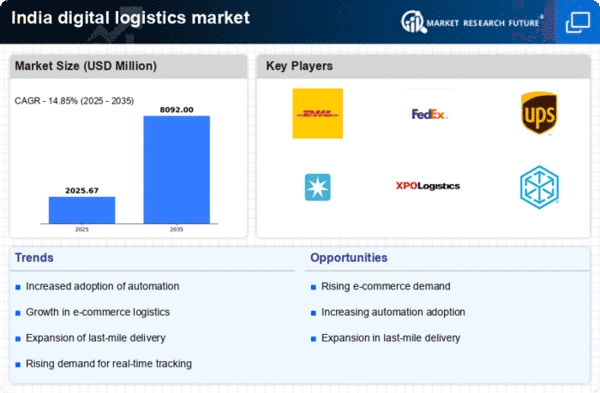Rising E-commerce Demand
The digital logistics market in India is experiencing a surge due to the increasing demand for e-commerce services. With online retail sales projected to reach $200 billion by 2026, logistics providers are adapting to meet the needs of this expanding sector. The growth of e-commerce necessitates efficient supply chain solutions, which in turn drives innovation in digital logistics. Companies are investing in technology to streamline operations, enhance delivery speed, and improve customer satisfaction. This trend indicates a robust opportunity for logistics firms to leverage digital tools to optimize their processes and cater to the evolving consumer preferences. As a result, the digital logistics market is likely to witness significant growth, driven by the need for agile and responsive logistics solutions in the face of rising e-commerce activities.
Government Initiatives and Policies
The Indian government is actively promoting the digital logistics market through various initiatives aimed at enhancing infrastructure and technology adoption. Programs such as the National Logistics Policy aim to reduce logistics costs from 13% to 8% of GDP by 2025. This policy framework encourages the integration of digital technologies in logistics operations, fostering a conducive environment for growth. Additionally, the implementation of the Goods and Services Tax (GST) has streamlined inter-state logistics, further boosting the digital logistics market. These government efforts are likely to create a more efficient logistics ecosystem, enabling companies to adopt digital solutions that enhance operational efficiency and reduce costs.
Increased Focus on Customer Experience
In the digital logistics market, there is a growing emphasis on enhancing customer experience. As consumer expectations evolve, logistics providers are compelled to adopt digital solutions that offer transparency, speed, and reliability. The integration of customer-centric technologies, such as mobile applications and real-time tracking systems, is becoming commonplace. This shift is indicative of a broader trend where logistics firms prioritize customer satisfaction as a key differentiator. Companies that successfully implement these digital solutions may see an increase in customer loyalty and retention rates. Therefore, the digital logistics market is likely to expand as businesses recognize the importance of delivering exceptional customer experiences in a competitive landscape.
Technological Advancements in Supply Chain
Technological advancements are playing a pivotal role in shaping the digital logistics market in India. Innovations such as artificial intelligence (AI), machine learning, and the Internet of Things (IoT) are being increasingly integrated into logistics operations. These technologies facilitate real-time tracking, predictive analytics, and automated inventory management, which are essential for optimizing supply chains. The adoption of such technologies is expected to increase operational efficiency by up to 30%, thereby enhancing the competitiveness of logistics providers. As companies strive to improve their service offerings, the digital logistics market is likely to expand, driven by the need for advanced technological solutions that address the complexities of modern logistics.
Growing Urbanization and Infrastructure Development
Urbanization in India is accelerating, with projections indicating that by 2031, 600 million people will reside in urban areas. This demographic shift is creating a pressing need for efficient logistics solutions to support urban supply chains. The digital logistics market is poised to benefit from this trend as companies seek to optimize last-mile delivery and reduce congestion in urban centers. Infrastructure development initiatives, such as the Bharatmala and Sagarmala projects, are enhancing connectivity and facilitating smoother logistics operations. Consequently, the digital logistics market is likely to thrive as businesses adapt to the challenges posed by urbanization and leverage digital tools to improve their logistics capabilities.
















